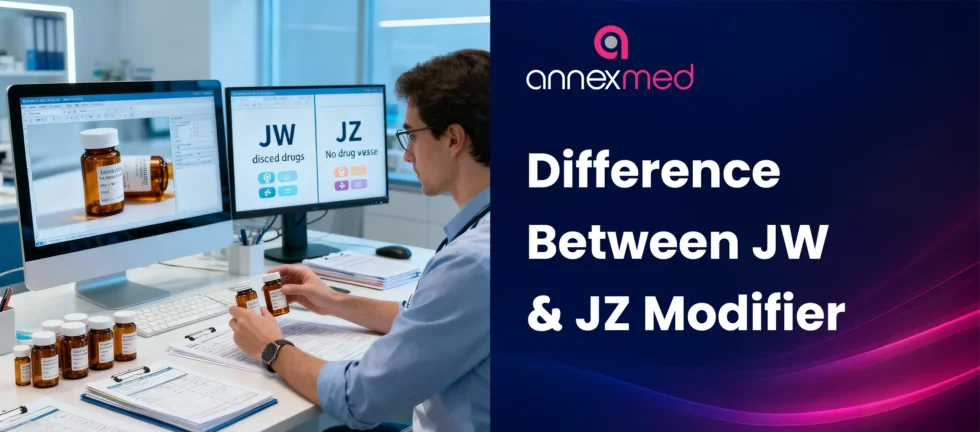Accurate reporting of drug wastage plays a major role in clean claim submission, especially for medications supplied in single-use vials. To support transparency and reduce billing errors, CMS requires the use of two specific modifiers JW and JZ. Understanding when each applies helps organizations avoid preventable denials, maintain compliance, and strengthen reimbursement accuracy.
According to the Centers for Medicare & Medicaid Services, manufacturers are now required to refund Medicare for certain discarded amounts of Part B drugs, underscoring the importance of accurate JW and JZ modifier reporting for compliance and reimbursement.
Table of Contents
What Is the JW Modifier?
The JW modifier is used when part of a single-use vial is administered and the remaining portion must be discarded. It allows providers to report the exact amount of medication wasted, as long as the wastage is documented and the drug is eligible for separate reimbursement.
This modifier ensures payers can clearly see both the units administered and the units discarded, supporting accurate payment and a stronger audit trail.
What Is the JZ Modifier?
The JZ modifier was introduced to confirm that no drug wastage occurred. It applies when the full amount from a single-use vial is administered to the patient, with zero discarded units. CMS now requires this modifier to prevent assumptions or miscoding and to reinforce transparency in drug utilization reporting.
Using JZ signals that documentation reflects complete usage, helping avoid claim delays related to missing wastage details.
Key Differences Between JW and JZ Modifier
While both modifiers relate to single-use vials, they serve opposite purposes. JW applies when there is documented wastage, while JZ applies when no wastage occurs.
Using the wrong modifier or skipping it can lead to denials, compliance issues, or requests for additional information.
A simple way to remember the difference:
- JW = Wastage reported
- JZ = Zero wastage
JW vs. JZ Modifier: Quick Comparison Table
| Criteria | JW Modifier | JZ Modifier |
| Purpose | Reports drug wastage | Confirms zero wastage |
| When Used | When part of a single-use vial is discarded | When the entire single-use vial is administered |
| Documentation Required | Yes, wastage amount must be recorded | Yes, note that no wastage occurred |
| Claim Reporting | Two line items: administered units + wasted units | Single line item with JZ to show full usage |
| CMS Expectation | Mandatory when wastage occurs | Mandatory to avoid assumptions of unreported wastage |
| Common Denial Trigger | Missing wastage details | Omitting JZ when no wastage exists |
| Applies to Multi-Dose Vials | No | No |
Common Billing Scenarios (With Examples)
Scenario 1: Drug wastage present → Use JW
A 100-unit vial is purchased, 80 units are administered, and 20 units are discarded.
You report:
- Units administered
- Units wasted (with JW)
Scenario 2: No wastage → Use JZ
A full single-use vial is administered with nothing discarded.
You report:
- Units administered
- JZ modifier
Scenario 3: Multi-dose vial
JW and JZ do not apply to multi-dose vials. Only single-use vials fall under these reporting rules.
Scenario 4: Facility vs. non-facility settings
Usage stays the same, but documentation expectations vary by setting, making accurate unit calculation even more critical.
CMS Compliance Requirements to Know
CMS requires clear documentation of administered and discarded amounts whenever JW is used. Claims should reflect the exact number of units for each line item and match what’s documented in the medical record.
Since 2023, CMS has increased enforcement for both modifiers, making consistent reporting essential to avoid future recoupments or audit findings.
Frequent Mistakes and How to Avoid Them
Common errors include missing wastage documentation, applying JW or JZ in the wrong scenarios, and miscalculating units. These issues often lead to denials or compliance red flags.
Accurate documentation, clear workflows, and periodic claims review help teams avoid these avoidable mistakes and maintain billing accuracy.
How Accurate Modifier Use Improves Revenue Integrity
Correct use of JW and JZ supports cleaner claims, reduces denial rates, and strengthens documentation across the board. It also helps organizations forecast drug purchases more accurately and maintain a reliable audit trail that aligns with CMS expectations.
Clear use of JW and JZ modifiers strengthens compliance and keeps reimbursements predictable. With regulatory expectations tightening, many practices are turning to smarter workflows and expert oversight to avoid preventable denials. AnnexMed brings that level of support with reliable coding review, updated compliance insights, and a proactive approach to revenue integrity.
Get the clarity your team needs.
AnnexMed can help you keep claims accurate and moving without delays.
FAQs
CMS may treat the claim as incomplete because it lacks confirmation of zero wastage. This often leads to delays, additional documentation requests, or avoidable denials.
Check the medication’s packaging and HCPCS code description. If it’s labeled as a single-use vial, JW and JZ rules apply even if the provider uses the entire amount.
Yes. The exact wastage amount must be recorded in the clinical note or medication record. Without clear documentation, payers may question the billed wastage units.
Definitely. Clean reporting of wastage or the confirmation of zero wastage, helps claims pass payer reviews on the first submission, reducing back-and-forth requests.
CMS tightened enforcement to reduce misuse of drug billing and strengthen transparency. Accurate modifier use ensures clear documentation of how every unit of a single-use vial was used.






























